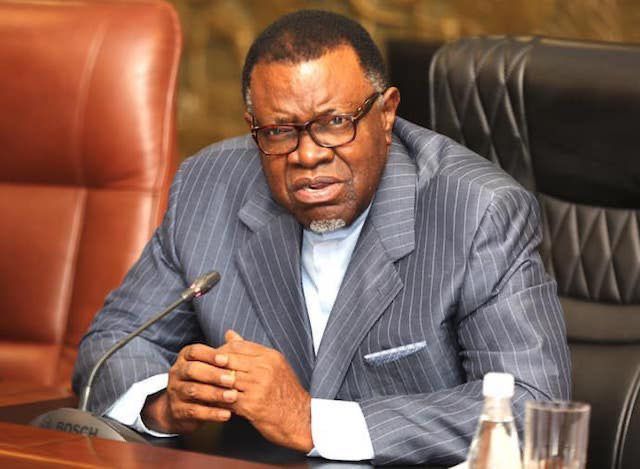SUPPORTERS of political parties who become unhappy when their leaders make late changes to candidates lists or impose unelected people on them have no one else to blame but themselves.
That appears to be the message in the ruling of Judge Kato van Niekerk when she, on Monday, advanced reasons for turning down an application of four Swapo members in Ongwediva. They had asked the High Court to block the ruling party from replacing the election candidates with people who had not been on the party’s list during the municipal elections last month.The candidate ‘replacements’ were thus effectively appointed to the town council.Van Niekerk last week dismissed the application and ordered the applicants to pay Swapo’s legal cost but had not provided reasons.In the judgement issued on Monday, Van Niekerk conceded that “the question does arise whether a change of members [that] occurred in this case [Ongwediva] does not defeat the very purpose of the legislation”.But, she concluded, “the emphasis in elections by party lists (as opposed to wards) is voting for the particular party, and not the candidates on its list”.Van Niekerk said: “In my view, if the supporters of a particular party are dissatisfied with last minute changes to a party list, there are other ways of expressing and conveying that dissatisfaction, for example, internally through the party structures or at the ballot box.”The judgement flies in the face of arguments by the applicants – Angelina Amushigamo, Samuel Nanguti, Nangolo Auala and Johnny Kanandjembo – that [the process] had abused and humiliated them.The four were on the list of seven Swapo candidates for the Ongwediva town council and had been asked to campaign for the party so they could become councillors.After the voting, however, they were removed without reason and replaced with previous councillors who had failed to be nominated at the party’s district election ahead of the May 14 local authorities poll.Van Niekerk said she relied on the Local Authorities Act, which gives the political organisations a right to withdraw their candidates from the council and replace them whenever they wished.The acting judge said that “there is no indication whatsoever on the evidence before” her that Swapo had failed to follow “basic requirements” set by law when they replaced the four applicants.”I must therefore assume that their nominations in themselves were in order.”At the same time, Van Niekerk said she expressed “no opinion on the manner in which” Swapo used the power contained in the legislation.The four applicants, she pointed out, had not asked for a review of how Swapo went about withdrawing their names.Amushigamo, Nanguti, Auala and Kanandjembo would still be able to “institute review proceedings” against Swapo.Despite the victory, the judge had a word of caution for the ruling party after its Deputy Secretary General, John Pandeni, suggested in court papers that they had the “prerogative” to withdraw the names of elected councillors at a whim.”If ‘prerogative’ is meant to convey power to exercise without any restrictions, these reasons must not be seen as supporting such a meaning,” Van Niekerk said.She confirmed that the applicants would have to pay both their own and Swapo’s legal costs, but turned down a request by the party’s lawyers that punitive cost judgement be given against them.It is still not clear whether the applicants intend to pursue the case or drop it altogether.However, some Ongwediva residents have criticised the manner in which the ruling party nominated people who had been rejected without giving reasons.Swapo reportedly told the Ministry of Regional, Local Government and Housing that previous Ongwediva councillors were put back in the seats because the town was seen by central Government as the best-run in the country.The four applicants were represented by Hosea Angula of Lorentz and Bone as well as advocate Dave Smuts.Swapo hired advocate Gerson Hinda on the instruction of Conradie & Damaseb.They had asked the High Court to block the ruling party from replacing the election candidates with people who had not been on the party’s list during the municipal elections last month.The candidate ‘replacements’ were thus effectively appointed to the town council.Van Niekerk last week dismissed the application and ordered the applicants to pay Swapo’s legal cost but had not provided reasons.In the judgement issued on Monday, Van Niekerk conceded that “the question does arise whether a change of members [that] occurred in this case [Ongwediva] does not defeat the very purpose of the legislation”.But, she concluded, “the emphasis in elections by party lists (as opposed to wards) is voting for the particular party, and not the candidates on its list”.Van Niekerk said: “In my view, if the supporters of a particular party are dissatisfied with last minute changes to a party list, there are other ways of expressing and conveying that dissatisfaction, for example, internally through the party structures or at the ballot box.”The judgement flies in the face of arguments by the applicants – Angelina Amushigamo, Samuel Nanguti, Nangolo Auala and Johnny Kanandjembo – that [the process] had abused and humiliated them.The four were on the list of seven Swapo candidates for the Ongwediva town council and had been asked to campaign for the party so they could become councillors.After the voting, however, they were removed without reason and replaced with previous councillors who had failed to be nominated at the party’s district election ahead of the May 14 local authorities poll.Van Niekerk said she relied on the Local Authorities Act, which gives the political organisations a right to withdraw their candidates from the council and replace them whenever they wished.The acting judge said that “there is no indication whatsoever on the evidence before” her that Swapo had failed to follow “basic requirements” set by law when they replaced the four applicants.”I must therefore assume that their nominations in themselves were in order.”At the same time, Van Niekerk said she expressed “no opinion on the manner in which” Swapo used the power contained in the legislation.The four applicants, she pointed out, had not asked for a review of how Swapo went about withdrawing their names.Amushigamo, Nanguti, Auala and Kanandjembo would still be able to “institute review proceedings” against Swapo.Despite the victory, the judge had a word of caution for the ruling party after its Deputy Secretary General, John Pandeni, suggested in court papers that they had the “prerogative” to withdraw the names of elected councillors at a whim.”If ‘prerogative’ is meant to convey power to exercise without any restrictions, these reasons must not be seen as supporting such a meaning,” Van Niekerk said.She confirmed that the applicants would have to pay both their own and Swapo’s legal costs, but turned down a request by the party’s lawyers that punitive cost judgement be given against them.It is still not clear whether the applicants intend to pursue the case or drop it altogether.However, some Ongwediva residents have criticised the manner in which the ruling party nominated people who had been rejected without giving reasons.Swapo reportedly told the Ministry of Regional, Local Government and Housing that previous Ongwediva councillors were put back in the seats because the town was seen by central Government as the best-run in the country.The four applicants were represented by Hosea Angula of Lorentz and Bone as well as advocate Dave Smuts.Swapo hired advocate Gerson Hinda on the instruction of Conradie & Damaseb.
Stay informed with The Namibian – your source for credible journalism. Get in-depth reporting and opinions for
only N$85 a month. Invest in journalism, invest in democracy –
Subscribe Now!






